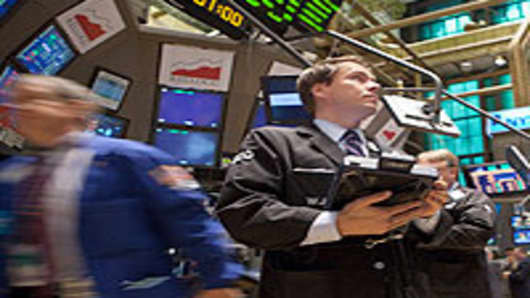The Dow may be ready to make another run at 11,000, as investors look ahead to the start of earnings season next week.
Traders said the market traded well Thursday, despite an early down draft on worries about Greece. The Dow finished at 10,927, up 29, and the S&P 500 rose 3 to 1186.
Surprisingly strong March chain store sales reports helped drive consumer discretionary stocks 1 percent higher, the best performing S and P sector on the day.
"This market's looking for an excuse to sell off and can't find one," said John O'Donoghue of Cowen.
The market has high expectations for quarterly earnings comparisons, and analysts expect to see more top line growth this quarter. "I think you'll find stocks will behave differently. That's when stocks are going to move on fundamentals, not just on liquidity," O'Donoghue said. While the earnings season is expected to be a positive catalyst, some traders say it may be a time when investors take profits, like last quarter.
Alcoa kicks off the start of earnings season, when it reports after the bell Monday. Intel , J.P. Morgan , Google , AMD , and General Electric also report next week.
Just a few earnings are expected Friday. They include Constellation Brands and Shaw Communications .
February wholesale trade data is reported at 10 a.m. Friday, and the Financial Crisis Inquiry Commission holds its third day of hearings. Participants include former Fannie Mae Chairman Donald Mudd.
The euro Thursday came off its lows after European Central Bank President Jean-Claude Trichet said default is not an issue for Greece. The euro had been as low as $1.3282, but finished at $1.335.
The spreads between Greek 10-year bonds and the German benchmark bund had reached a record high Thursday, as did the cost of insuring Greek debt, using credit default swaps. Before the New York open, the CDS on 5-year bonds had widened to 466 bps, from 413.4 the day earlier.
Amitabh Arora, head of rates strategy at Citigroup, said the Greek situation will likely linger for a long time before a solution is found, and it may ultimately be an IMF solution. "With Greece, it's not a once off as whether it happens or not. I think it will be a festering sore," he said.
Arora said the Treasury's $13 billion auction of 30-year bonds was not as good as Wednesday's auction of 10-year notes. "The market felt a little softer and there was not the same frenzy of bidding as there was in the 10-year," he said. The 30-year auction finished off the Treasury's $82 billion note supply this week.
The 10-year yield was at 3.89 percent late in the day, and the 30-year was at 4.75 percent.
Markets have been watching the dialogue between China and the U.S. on China's currency. The yuan and other Asian currencies rose as Treasury Secretary Tim Geithner met with Vice Premier Wang Qishan Thursday. China has signaled it will let its currency appreciate, something U.S. officials have sought.
Even before an official announcement has been made, traders already worried that China may buy fewer U.S. Treasurys if its currency becomes stronger. Arora said he does not see that as a problem.
"I think it depends on how large the currency move is. The thing people miss is that China revalued its currency by 20 percent from the period 2005 to 2008, but their participation in the Treasury market continued and actually deepened," he said. "The participation of China is a direct consequence of its current account surplus. The current account surplus is not going to change dramatically in the near term with the size of the currency move planned.
"What people think is there would be a 2 to 3 percent immediate revaluation, then the currency would be allowed to float and gently continue revaluations of 5 percent a year. Over time, that would help to reduce the current account surplus but that's not going to be an immediate impact," he said.
Questions? Comments? Email us at marketinsider@cnbc.com



